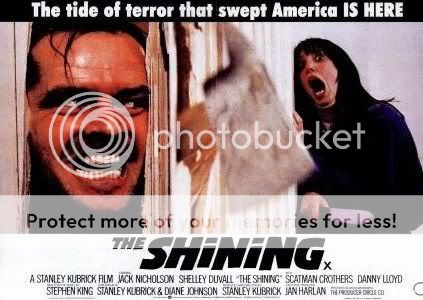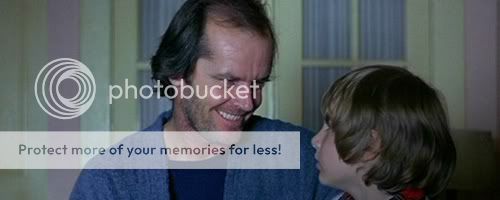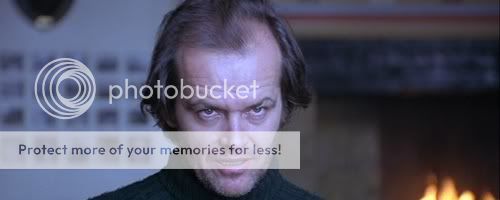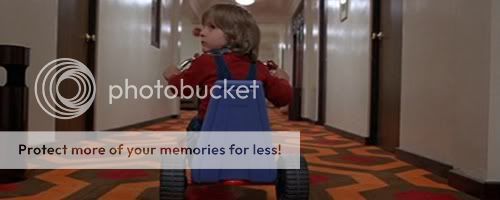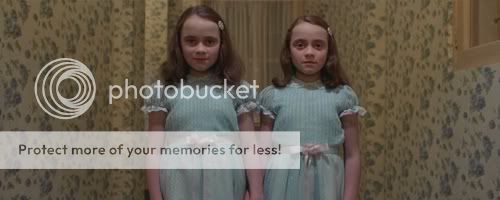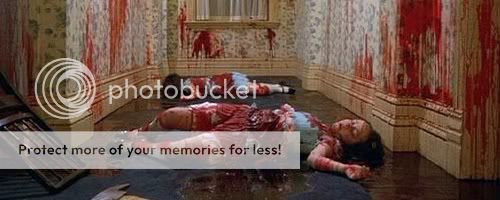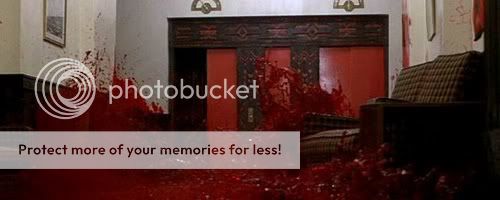A struggling writer, Jack Torrance, takes a job as an off-season caretaker at the isolated Overlook Hotel. His young son Danny, who accompanies him along with his wife, possesses psychic abilities and is able to see things in the future and past, such as the ghosts who inhabit the hotel. This psychic ability is called "shining". Soon after moving in, a winter storm leaves the family snowed in and Jack becomes influenced by a supernatural presence in the hotel; he descends into madness and attempts to murder his wife and son.
Stanley Kubrick's The Shining can easily be considered among the most effective and chilling horror films of all time. A true artistic achievement smartly hidden in the guise of a commercially viable film, it will forever be know as a masterpiece from one of the greatest directors to ever live. More than that, it will continue to inspire generations of filmmakers and influence thousands of movies throughout the coming decades, as it is simply one of a kind, a film that challenges the viewer, a film that pushes the boundaries of convention and, above all else, a film that leaves its audience chilled to the bone. Clearly the work of a genius in all facets, The Shining is so much more than a simple haunted house tale or a story of one man's descent into madness. It is a metaphor for indignity, a musing on the tale of a society that overlook's (much like the name of the hotel itself) its own shadowy past, preferring to sweep it under a rug that encompasses so much history. Perhaps that last statement was slightly deeper than I intended to go with this review, yet I cannot help myself, as such an intellectually taxing film deserves an equally complimentary response. I have spent years watching this film and analyzing it from multiple angles, and to put forth all my opinions and thoughts on it would easily make this the longest review that I've ever done. Instead of boring you to tears with a dissertation on the film itself, I will simply stick to my normal style of review and at times I will toss in a few of my observations about this films true meanings and intentions which have been derived through my countless viewings of it. Quite simply, I see The Shining as not only a masterpiece of contemporary horror, but as a flawless film that operates on another level entirely, transcending mere genres and becoming inspiring in its styling. The Shining may not have been the film Stephen King wanted it to be, but it nevertheless stands as perhaps the greatest example of a true auteur working at the absolute peak of his prowess.
Directed by Kubrick and written by him along with Diane Johnson, the genesis of the project came about from the simple need to make money. After Kubrick directed Barry Lyndon in 1975, a highly visual period film about an Irish man who attempts to make his way into the English aristocracy, he soon realized that despite its technical achievement, the film was not a box office success in the United States and was derided by critics for being too long and too slow. Kubrick, disappointed with Barry Lyndon's lack of monetary gain, realized he needed to make a film that would be commercially viable as well as artistically fulfilling. Thus he set about tackling an adaptation of Stephen King's original novel, as King was undoubtedly a huge draw by name alone. Kubrick and Johnson took great liberties in telling their version of the story, changing many key elements of King's source material to suit their vision, and while some of the alterations are drastic, they by no means detract from the viewing experience. At the time, the film was noted for several things, including its use of Steadicam technology, an incredibly arduous shooting schedule due to Kubrick's meticulous nature and dissension among the cast members. Even more so than that, when it was finally released, King himself stated that he felt it was not a good adaptation of his novel and that it was the only one he can truly remember hating on its release. He felt Kubrick ignored several of his main themes in favour of crafting his own film, which in essence he did. Then again, King couldn't possibly have expected a genius such as Kubrick to rely solely on his source material for inspiration. A true intellect can free themselves of the confines of such things, and Kubrick's final product reflects that statement quite well. One thing is certain, a film with such a small cast in such a confined and isolated space would require pitch perfect performances, and Kubrick definitely hit the nail on the head with his casting choices for The Shining.
Jack Nicholson had already begun to show signs of his impending superstardom and was Kubrick's original choice for the role of Jack Torrance. I don't think one can overstate the importance of Nicholson's performance in this film to its overall quality, its almost as if he was born to play the role of Torrance, and in his portrayal he actually becomes that character to a shocking level of effectiveness. To make things even better (or worse if you look at it from his perspective), the majority of his performance was done on the fly, as the shooting script was constantly being changed. A famous story from the production of this film involves Nicholson becoming so frustrated with the ever-changing script that he would just throw away the copies that the production team would give to him to memorize, knowing that it was just going to change anyway. He learned most of his lines just minutes before filming them and perhaps his most iconic moment, the "Here's Johnny" scene, was actually ad libbed. Shelly Duvall portrays his wife Wendy, and when she looks emotionally distraught its because she really was. During production of the film, she didn't get along well with Kubrick, frequently arguing with him on set about lines in the script, her acting techniques and numerous other things. Duvall eventually became so overwhelmed by the stress of her role that she became physically ill for months. At one point she was under so much stress that her hair began to fall out. Still, she manages to give an excellent performance especially when working opposite Nicholson, clearly a much better actor. Luckily these two were the only actors who seemed troubled by Kubrick, as little Danny Lloyd does a great job for a child actor and never fails to impress in his screen time, as does Scatman Crothers as the kindly chef Dick Halloran. The character of Halloran is actually quite an important one, so it was an inspired choice to hire an actor of Crothers caliber for such a small but vital role. Though they may have had their fair share of problems with Kubrick, at the very least they banded together to put on some of the best performances of their individual careers, so I must praise the cast for their perseverance and dedication to their craft.
Before I get to a lot of the more complex elements of this film, I thought it would be appropriate to examine its technical merits, because it is an extremely innovative piece that makes use of several elements that would become standards in Hollywood in the years to come. First and foremost among these is the use of Steadicam technology to provide several long tracking shots, most notably the beginning of the film and the scene where Danny rides his big wheel (I had a Knight Rider one, just to show how old I am) through the hotel. The use of the Steadicam makes these tracking shots take on an surreal quality that really makes them stand out amongst others in the film. Sound was another thing that Kubrick used to great advantage, such as in the same shot of Danny riding the big wheel, where the sound alternated between incredibly loud when Danny is riding on the wooden floor and eerily quiet when he's on the carpet. The excellent sound work is only further enhanced by the contributions of pioneering electronic composer Wendy Carlos, who had previously worked with Kubrick on A Clockwork Orange. Her brilliant yet subtle synthesizer heavy score is a thing of beauty and indeed just listening to this film can scare you half to death. The opening theme is simply one of the most ominous I have ever heard in a film and really sets the tone for the story to follow, almost as if it were an overture before a stage production. The set design is also quite incredible, as the Overlook Hotel itself was constructed on a massive set which included both a full exterior and interior. The hotel is certainly another character in this film, one that has a certain charisma all unto itself. I found it particularly interesting that the hotel is not designed to look like any singular American style inn, but rather a pastiche of all of them, thereby giving it a mosaic sort of feel and allowing it to become any hotel in America as opposed to a specific one. As the majority of the film takes place in this hotel, it was vital to give it a life of its own, something that Kubrick took very seriously and unquestionably succeeded at.
There is a certain amount of ambiguity in the film itself which allows the viewer to make their own choices as to what exactly occurred during it. On the surface, it can seem like a simple tale of cabin fever and the effects of isolation on an already fragile mind, however this is only the most overt way of explaining the film. Others have challenged that it represents many things, from the crisis in masculinity and sexism to corporate America and racism. An even more radical theory was discussed in an essay by ABC reporter Bill Blakemore entitled "The Family of Man" first published in the San Francisco Chronicle in July 1987. Blakemore believed that indirect references to the American slaughter of Native Americans pervade the film as exemplified by the Indian logos on the baking powder in the kitchen and Indian artwork that appears throughout the hotel, though no Native Americans are ever seen. He also used the argument that Halloran, a black man, is the only one killed on screen and that he dies on a rug which is designed with an Indian motif and that the blood in the elevators represent the blood shed during the slaughter of the Indian's by American settlers. Still others have expanded even further on this theory and argued that Kubrick actually intended the film to be a metaphor for the holocaust. Even the final moments of the film leave the viewer with more questions than answers, as a long tracking shot down a hallway ends up with a picture of a Ball held at the hotel in 1921 with Nicholson clearly visible in the foreground. As the credits roll, there is the sound of talking as if from an audience. Some think that this is simply the chatter of the ghosts that occupy the hotel while I choose to believe that it echoes the actual audience themselves, leaving the film and talking about what they've just seen. One thing is for certain, Kubrick managed to create a film that would stay relevant for years after its release and is still debated heavily to this day by scholar's and critics the world over. Not many directors can claim that sort of influence.
The Shining was filmed on a budget of $22 million and though it started out slow at the box office, it eventually ended up grosing over $44 million. It was initially met with harsh criticism from many, though as with most Kubrick films, that criticism has turned to praise over the years and it is now hailed as the masterpiece that it truly is. I normally don't like to quote other reviewers but I felt that this one from Roger Ebert quite succinctly summed up the film and my own thoughts on it,
"Stanley Kubrick's cold and frightening The Shining challenges us to decide: Who is the reliable observer? Whose idea of events can we trust? It is this elusive open-endedness that makes Kubrick's film so strangely disturbing." This idea of being challenged is not seen often in horror films, and it is what makes The Shining so compelling. You will be left with way more questions than answers at the end of it, and while that is not always a good thing, in this case, nothing could be more appropriate. I have my own theories as to what the film means and I could probably fill up twenty more pages but as I said earlier, I don't want to bore anyone to tears, so I will simply end this review by saying that if you haven't seen The Shining, you owe it to yourself to check it out. It's not the easiest film to get through, but the rewards are limitless and that is sometimes the most important thing.
10/10 and of course my absolute highest recommendation.
"Tomorrow there will be more blood than this, if that's even possible."




